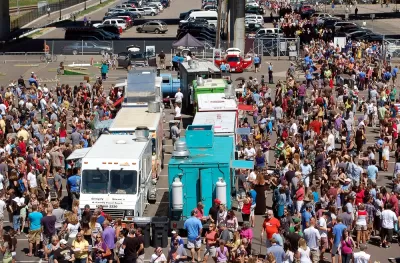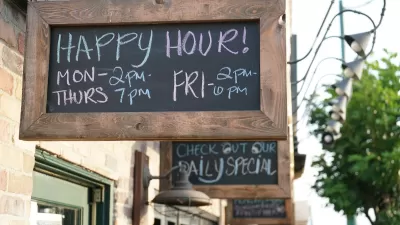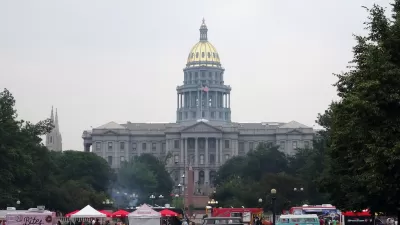Downtown property owners are clashing with food truck operators over where the latter should park their businesses.

As mobile merchants, food trucks encounter practical and regulatory questions that neither other vehicles nor other vendors contend with. Now Minneapolis is trying to balance the needs of food trucks and property owners in its Downtown area.
Property owners want to limit the number of trucks that can operate in the same area. But food truck operators say business is best when they vend together, creating a "destination." They also want to expand the areas they can operate in, as well as the hours, to serve people leaving bars at closing time.
The city, according to MinnPost, comes down in the middle. It amended a local ordinance on food trucks in January—imposing some restrictions and removing others.
Some regulations are there for safety: Trucks can’t park in a space with a bike lane between it and the curb, which would put moving cyclists between the truck and the customer on the sidewalk.
Others—like prohibiting trucks from operating near fairs, parks, or sports stadiums—protect brick-and-mortar vendors from competition.
Though property owners say City Hall is soft on food trucks because of their popularity, the reporter says both mobile and stationary eateries appear to be thriving.
FULL STORY: Does Minneapolis have too many — or too few — rules governing food trucks?

Alabama: Trump Terminates Settlements for Black Communities Harmed By Raw Sewage
Trump deemed the landmark civil rights agreement “illegal DEI and environmental justice policy.”

Study: Maui’s Plan to Convert Vacation Rentals to Long-Term Housing Could Cause Nearly $1 Billion Economic Loss
The plan would reduce visitor accommodation by 25% resulting in 1,900 jobs lost.

Planetizen Federal Action Tracker
A weekly monitor of how Trump’s orders and actions are impacting planners and planning in America.

Waymo Gets Permission to Map SF’s Market Street
If allowed to operate on the traffic-restricted street, Waymo’s autonomous taxis would have a leg up over ride-hailing competitors — and counter the city’s efforts to grow bike and pedestrian on the thoroughfare.

Parklet Symposium Highlights the Success of Shared Spaces
Parklets got a boost during the Covid-19 pandemic, when the concept was translated to outdoor dining programs that offered restaurants a lifeline during the shutdown.

Federal Homelessness Agency Places Entire Staff on Leave
The U.S. Interagency Council on Homelessness is the only federal agency dedicated to preventing and ending homelessness.
Urban Design for Planners 1: Software Tools
This six-course series explores essential urban design concepts using open source software and equips planners with the tools they need to participate fully in the urban design process.
Planning for Universal Design
Learn the tools for implementing Universal Design in planning regulations.
Caltrans
Smith Gee Studio
Institute for Housing and Urban Development Studies (IHS)
City of Grandview
Harvard GSD Executive Education
Toledo-Lucas County Plan Commissions
Salt Lake City
NYU Wagner Graduate School of Public Service





























